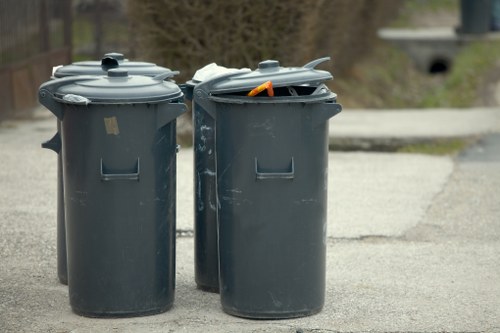Waste Recycling in Rubbish Sucks: Transforming Trash into Treasure

Waste Recycling has become a pivotal component in modern environmental strategies. As urbanization continues to surge, the challenge of managing rubbish grows exponentially. Unfortunately, the current state of waste recycling often leaves much to be desired, leading many to feel that rubbish sucks.
Despite advancements in recycling technologies, inefficiencies and lack of public participation hinder progress. Communities worldwide struggle with inadequate infrastructure, making it difficult to effectively process and repurpose waste materials.
Moreover, misinformation and lack of awareness exacerbate the problem. Many individuals are unsure about what can be recycled, leading to contamination of recycling streams and reduced effectiveness of recycling programs.
The Current State of Waste Recycling

The landscape of waste recycling is fraught with challenges that contribute to the sentiment that rubbish sucks.
Firstly, the contamination of recyclable materials is a significant issue. When non-recyclable items are mixed with recyclables, it compromises the entire recycling process, rendering materials unsuitable for reuse.
Secondly, the lack of standardized recycling protocols across different regions leads to confusion and inefficiency. Without a unified approach, it's difficult to implement effective recycling programs on a large scale.
Technological Limitations in Recycling

Technology plays a crucial role in enhancing the efficiency of waste recycling. However, current technologies often fall short in handling the vast diversity of waste materials.
For example, automated sorting systems can struggle with materials that are similar in appearance but differ in composition. This leads to increased manual processing, higher costs, and slower recycling rates.
Additionally, the development of advanced recycling methods, such as chemical recycling, is still in its infancy. Investment in research and development is essential to overcome these technological barriers.
Environmental Impact of Inefficient Recycling

Inefficient waste recycling has profound environmental implications. When recyclable materials end up in landfills, they contribute to soil and water pollution, greenhouse gas emissions, and loss of valuable resources.
Landfills are a major source of methane emissions, a potent greenhouse gas that exacerbates climate change. Reducing the amount of waste sent to landfills through effective recycling can significantly mitigate these environmental impacts.
Moreover, the extraction and processing of virgin materials are resource-intensive and environmentally damaging. Recycling conserves natural resources, reduces energy consumption, and minimizes habitat destruction.
Economic Consequences of Poor Recycling Practices

The economic ramifications of subpar waste recycling practices are substantial. Inefficient recycling processes lead to increased costs for waste management, as more resources are required to handle and dispose of waste.
Furthermore, the loss of recyclable materials represents a missed economic opportunity. Recycled materials can be transformed into new products, creating jobs and stimulating economic growth.
Investing in effective recycling infrastructure and technologies can yield long-term economic benefits, including reduced waste management costs and the development of sustainable industries.
Strategies for Improving Waste Recycling

To address the challenges associated with waste recycling, a multifaceted approach is necessary. Implementing comprehensive strategies can transform the current state of rubbish management.
One effective strategy is to enhance public education and awareness. Informing individuals about the importance of recycling and how to properly sort waste can significantly improve participation rates and reduce contamination.
Another important measure is to standardize recycling protocols across different regions. Establishing clear guidelines ensures consistency and efficiency in recycling processes, making it easier for both citizens and waste management services to comply.
Investment in Advanced Recycling Technologies

Advancing waste recycling requires substantial investment in cutting-edge technologies. Innovations such as automated sorting, chemical recycling, and biodegradable materials can revolutionize the recycling industry.
Automated sorting systems that leverage artificial intelligence can improve the accuracy and speed of recycling processes, reducing the reliance on manual labor and minimizing errors.
Chemical recycling offers the potential to break down complex plastics into their constituent molecules, enabling the creation of new, high-quality materials from recycled waste.
Community Engagement and Participation

Engaging communities in waste recycling initiatives is essential for success. Active participation from residents ensures that recycling programs are utilized effectively and sustainably.
Community-driven recycling programs, such as local collection events and recycling education workshops, can foster a sense of ownership and responsibility among residents.
Incentive-based programs, where individuals receive rewards for recycling, can further motivate participation and enhance the overall effectiveness of recycling efforts.
Government Policies and Regulations

Effective waste recycling is also dependent on robust government policies and regulations. Implementing mandates and providing subsidies can drive the adoption of recycling practices.
Policies that require manufacturers to incorporate recycled materials into their products can create a sustainable market for recyclables, ensuring a steady demand and reducing waste.
Additionally, providing financial incentives for businesses to invest in recycling infrastructure can accelerate the development of more efficient waste management systems.
The Role of Education in Waste Recycling

Education plays a pivotal role in improving waste recycling outcomes. By increasing awareness and understanding, individuals are more likely to engage in proper recycling behaviors.
Educational programs in schools can instill environmentally responsible habits from a young age, shaping future generations to prioritize sustainability and waste reduction.
Public campaigns that highlight the benefits of recycling and provide practical tips can enhance community-wide participation and support for recycling initiatives.
Innovative Approaches to Waste Management

Innovative approaches to waste recycling are essential for overcoming existing challenges. Embracing creativity and flexibility can lead to more effective and sustainable waste management solutions.
For instance, the circular economy model emphasizes the continual use of resources, minimizing waste by designing products for longevity and recyclability.
Additionally, leveraging digital technologies, such as blockchain, can improve transparency and traceability in recycling processes, ensuring accountability and enhancing system efficiency.
Benefits of Effective Waste Recycling

Implementing effective waste recycling systems offers numerous benefits, both environmentally and economically.
Environmentally, recycling reduces the need for raw material extraction, conserving natural resources and preserving ecosystems. It also minimizes pollution and greenhouse gas emissions associated with waste disposal.
Economically, recycling creates jobs in the collection, processing, and manufacturing sectors. It also reduces costs related to waste management and raw material procurement, contributing to overall economic sustainability.
Social Advantages of Recycling

The social benefits of waste recycling extend beyond environmental and economic gains. Recycling fosters community engagement, enhances public health, and promotes social responsibility.
Community recycling programs bring individuals together, fostering a sense of collective purpose and cooperation. They also contribute to cleaner and healthier living environments by reducing waste and preventing pollution.
Moreover, recycling initiatives promote social responsibility, encouraging individuals to take an active role in protecting the planet and contributing to sustainable development.
Overcoming Barriers to Waste Recycling

Addressing the sentiment that rubbish sucks requires overcoming several barriers to effective waste recycling.
One major barrier is the lack of convenient recycling facilities. Without accessible and user-friendly recycling centers, individuals may be discouraged from participating in recycling programs.
Another challenge is the economic viability of recycling certain materials. Fluctuating market prices for recyclable commodities can impact the sustainability of recycling operations.
Enhancing Accessibility to Recycling Services

Improving access to waste recycling services is crucial for increasing participation rates. This can be achieved by expanding the availability of recycling bins, establishing more collection points, and integrating recycling into daily life.
Implementing curbside recycling programs, for example, makes it easier for households to participate without significant effort, thereby enhancing overall recycling rates.
Additionally, investing in mobile recycling units and community drop-off centers can cater to areas with limited access, ensuring that all community members can contribute to recycling efforts.
The Future of Waste Recycling

The future of waste recycling holds promising potential with continued innovation and collaboration. Embracing new technologies, fostering community engagement, and implementing effective policies are key to transforming waste management.
Emerging technologies, such as artificial intelligence and biotechnology, can revolutionize recycling processes, making them more efficient and sustainable. These advancements can address current limitations and open new avenues for recycling applications.
Furthermore, fostering global collaboration and knowledge sharing can accelerate progress in waste recycling, ensuring that best practices are adopted and adapted across different regions and contexts.
Global Initiatives and Partnerships

Global initiatives and partnerships play a vital role in advancing waste recycling efforts. Collaborative efforts between governments, businesses, and non-profit organizations can drive systemic change and promote sustainability.
International agreements that set recycling targets and standards can harmonize efforts across countries, facilitating more effective waste management on a global scale.
Partnerships between public and private sectors can leverage resources and expertise, fostering innovation and scaling successful recycling models to new regions.
Conclusion: Turning Rubbish Sucks into Sustainable Solutions

The perception that rubbish sucks is a reflection of the current inefficiencies and challenges in waste recycling. However, by adopting comprehensive strategies, investing in technology, and fostering community engagement, it is possible to transform waste management into a sustainable and effective system.
Effective waste recycling not only mitigates environmental impacts but also offers economic and social benefits, contributing to a more sustainable and prosperous future.
Ultimately, overcoming the obstacles in waste recycling requires collective effort, innovation, and a commitment to environmental stewardship. By embracing these principles, society can turn the tide on waste management and create a healthier, more sustainable world.
Contact us today to learn more about how you can contribute to effective waste recycling and help turn rubbish into valuable resources. Book your service now and join the movement towards a cleaner, greener future.